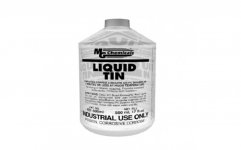Is there a preferred type of alloy used to connect up electrolytic capacitors in a power amp power supply.
Use 63/37 tin/lead solder.
RS, Rapid & Warton-metals all stock various sizes and fluxes.
Warton Metals Solders, Solderpastes, Fluxes and Lead-Free Solders
Don't use CPC, they stock 60/40 which becomes pasty as it cools and that can lead to broken/damaged joints.
63/37 is a eutectic solder. There are other lowish temperature eutectics but they all cost more in return for some advantages
62/36/2 silver or 62/37/1 copper are two that can be worth getting.
Solder - Wikipedia
RS, Rapid & Warton-metals all stock various sizes and fluxes.
Warton Metals Solders, Solderpastes, Fluxes and Lead-Free Solders
Don't use CPC, they stock 60/40 which becomes pasty as it cools and that can lead to broken/damaged joints.
63/37 is a eutectic solder. There are other lowish temperature eutectics but they all cost more in return for some advantages
62/36/2 silver or 62/37/1 copper are two that can be worth getting.
Solder - Wikipedia
Last edited:
Forgive me for not being clear.
I was referring to solid aluminium bar, sometimes used to link up electrolytic capacitors in amplifier power supplies.
I was referring to solid aluminium bar, sometimes used to link up electrolytic capacitors in amplifier power supplies.
I would think copper would be better than aluminum
Copper expands and contracts less, and is I recall aluminium
has an oxide layer that rapidly forms in the presence of air.
If you are mechanically connecting them and not soldering them
I would use a little Noalox at each terminal point to help
the connection maintain conductivity over time.
I would venture to think manufactures use
aluminum over copper since it cost less.
Copper expands and contracts less, and is I recall aluminium
has an oxide layer that rapidly forms in the presence of air.
If you are mechanically connecting them and not soldering them
I would use a little Noalox at each terminal point to help
the connection maintain conductivity over time.
I would venture to think manufactures use
aluminum over copper since it cost less.
Copper is much better.
Resistivity: Cu 17x 10E-9 Al 28x 10E-9
Pure copper ( not alloys like brass ) is quite the best, Silver is 16x 10E-9.
Resistivity: Cu 17x 10E-9 Al 28x 10E-9
Pure copper ( not alloys like brass ) is quite the best, Silver is 16x 10E-9.
12mm by 1mm thick copper strip could be used to interconnect the terminals of the capacitors.
But it's far easier using insulated hook up wire or a little bigger.
There is a small advantage to having a little bit of resistance in the transformer to rectifier and rectifier to capacitor wiring than aiming for ultra low resistance.
But it's far easier using insulated hook up wire or a little bigger.
There is a small advantage to having a little bit of resistance in the transformer to rectifier and rectifier to capacitor wiring than aiming for ultra low resistance.
IF you are using a thick flat bar/strip such as shown above, say 10mm wide by 1 or 2 mm thick, metal used, be it copper or aluminum, is immaterial.
Yes, one will have almost twice the *resistivity* of the other, so what? ; in any case *resistance* will be unmeasurable and way less than any wiring connecting those capacitors to anything else.
FWIW the hundreds or thousands kilometers connecting your local distribution transformer to usine generators is aluminum if it´s modern, and electrons stored and later used by the amp come thanks to **aluminum** foil inside the capacitors.
Don´t let the tree hide the forest.
Yes, one will have almost twice the *resistivity* of the other, so what? ; in any case *resistance* will be unmeasurable and way less than any wiring connecting those capacitors to anything else.
FWIW the hundreds or thousands kilometers connecting your local distribution transformer to usine generators is aluminum if it´s modern, and electrons stored and later used by the amp come thanks to **aluminum** foil inside the capacitors.
Don´t let the tree hide the forest.
- Status
- Not open for further replies.
- Home
- Amplifiers
- Power Supplies
- Connecting Power supply Caps

